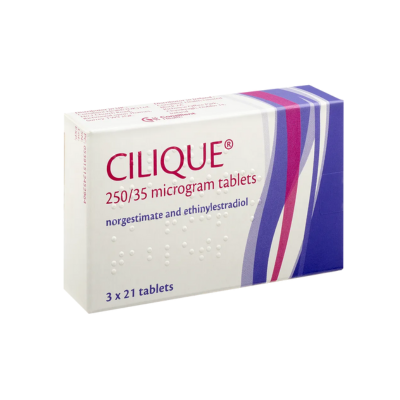Cilique
Images for illustrative purposes only
- Simple 21 Day Cycle
- Cycle Control
- UK Regulated Pharmacy
Cilique
Category:Contraceptives (Combined)Cilique is a brand name for a combination hormonal contraceptive pill used to prevent pregnancy. It is a combination birth control pill, which means it contains two types of hormones: an estrogen hormone (ethinyl estradiol) and a progestin hormone (gestodene).
Fetching Data...
All inclusive services
No extra costs
Free tracked delivery
Delivered in plain packaging
Prescription included
No consultation charges
Frequently Asked Questions for Cilique
Further Information
How it Works:
- Cilique primarily prevents pregnancy by inhibiting ovulation, the release of an egg from the ovary. It also thickens cervical mucus, making it more difficult for sperm to reach an egg, and alters the uterine lining, making it less receptive to a fertilized egg.
Administration:
- Cilique comes in the form of tablets, and one tablet is taken orally every day for 21 consecutive days, followed by a 7-day pill-free interval. During this pill-free interval, menstrual bleeding (withdrawal bleeding) typically occurs. After the 7-day break, a new pack of Cilique is started, and the cycle continues.
Effectiveness:
- When taken correctly and consistently, combination birth control pills like Cilique are highly effective at preventing pregnancy. It is important to take the pill at the same time each day and not to miss any doses to maintain its contraceptive effectiveness.
Side Effects:
- Common side effects of Cilique may include nausea, breast tenderness, headache, and irregular bleeding or spotting, especially during the first few months of use. Serious side effects are rare but can include blood clots, stroke, heart attack, and an increased risk of certain types of cancer. It's important to discuss the risks and benefits of using Cilique with your healthcare provider.
Contraindications:
- Cilique may not be suitable for everyone and should not be used in certain medical conditions or situations, such as:
- Pregnancy
- History of blood clots or certain cardiovascular conditions
- Liver disease
- History of certain types of cancer
- Known hypersensitivity or allergy to any of the pill's components
